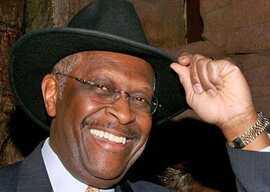
September 29, 2011

Herman Cain
The 2012 general election will, we are told by numerous pundits, be exceptionally “bitter” and “divisive.” I guess what they mean is that our Great National Neurosis (GNN)—you know which one I’m talking about—will be on full display.
With a deeply unsuccessful and increasingly unpopular black president defending his incumbency, it’s an easy guess. If you thought the political left enjoyed accusing people of racism before, wait ’til you see what they have in store the next few months. Bitter? Oh, yeah.
The GNN doesn’t always play out in predictable ways, though. Example: A lot of my acquaintances around New York City are calling Obama’s reign a “David Dinkins presidency.” Dinkins (1990-93) was NY’s first black mayor. To date he was also the last. Indeed, this very “blue” city has not merely not elected another black guy since Dinkins stepped down, they haven’t elected another Democrat.
People are predicting the Obama presidency will be like that. Whites will say: “OK, we did that, elected the black guy, got it out of the way. Now let’s go back to real politics.” They are even seeking out parallels: “Hey, look—Obama’s ticked off the Jews. Just like Dinkins!” (Dinkins’s feeble response to the Crown Heights black-on-Jew pogrom in 1991 lost him a lot of Jewish votes.)
Following the parallel, the US electorate, having demonstrated their anti-racist credentials by electing Obama in ’08, will dump him in ’12, then elect white Republicans for a couple of decades. So go the prognostications.
The scenario is not altogether implausible. The eagerness to elect Obama in ’08 was to some degree independent of party. It was also a bipartisan reaction to the awfulness of the Republican president and his would-be successor. Much of it was due to the yearning to do something people were told would be “historic.” It would of course only be “historic” the first time we did it. From then on, it would be politics as usual.
Such neatly repeating patterns are rare in politics, though. Obama is not out for the count yet. A great many things can happen in thirteen months.
And then there’s Herman Cain.
The first time Herman Cain really registered with me was back in June, when he dropped in at National Review to give us some face time. I’d like to give you a detailed account of the visit, but I’ve lost my notes, and I think it was supposed to be off the record anyway.
I recall being impressed and charmed by the man. Impressed: Cain gave off that aura of capable busy-ness that foreigners—I mean, people like myself, born and raised elsewhere—think of as “very American.” Charmed: Cain was relaxed, easygoing, quick-witted, and funny. He is clearly comfortable in his own skin. Seen up close, that skin is very black—much blacker than Barack Obama’s. I’d guess Cain’s ancestry as no more than one-thirty-second nonblack, perhaps entirely West African. Whatever it is, the man is not bothered about it one way or the other.
Set against Barack Obama’s agonized narcissism about his semi-blackness, Cain’s racial insouciance is very refreshing. It even left me slightly disturbed. The old folk wisdom about race is that full-bloods are easy with themselves, while it’s the half-castes who endure psychic torment and dysfunction. Barack Obama seems to ratify this, writing that weird, needy paean to his neglectful black father while his much more attentive and loving white mother was dying of cancer. As the father of two racial half-breeds myself, naturally I fret about this stuff. It’s not an issue with Cain.